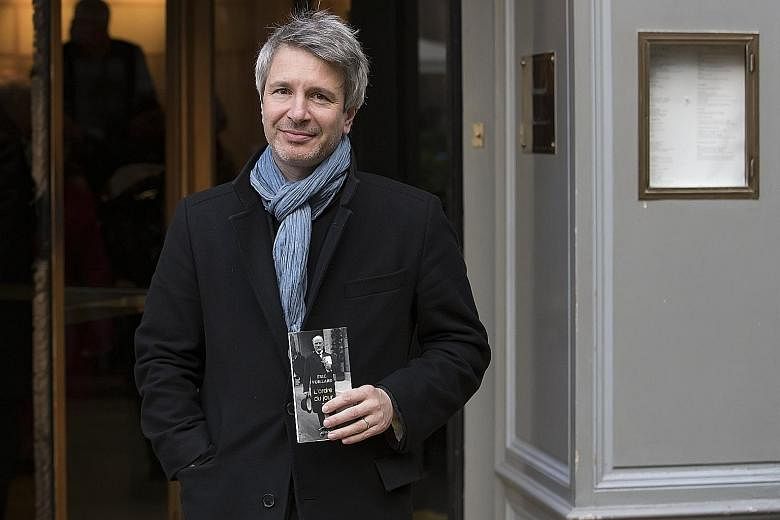PARIS • The prize is worth only €10 (S$15.80), but the author can expect a boost in book sales of 450,000 copies or more.
That prospect awaits Eric Vuillard, when his story of how German industry and finance backed Adolf Hitler won the Prix Goncourt, France's biggest literary prize, on Monday.
L'ordre Du Jour (Agenda, in English) had been among the favourites for the Goncourt prize - the most prestigious in the French-speaking world.
Vuillard, 49, said he was taken aback on hearing he won for his elegant, 160-page book which charts how the financial support of German industrialists was crucial in Hitler's push for power.
"One is always surprised, sometimes fatally," he told reporters at a Paris restaurant where the winner was announced.
Asked whether the book is a warning for today's populist times, the writer said he wanted to set out how the "elites slid into a situation where they compromised themselves".
His novelistic account of Hitler's rise, which sticks doggedly to the facts, turns on a secret meeting in February 1933 between Hitler and the heads of Krupp, Siemens, Opel, IG Farben and other major industrial groups, where they agreed to bankroll his election campaign.
Another award, the Renaudot, often seen as a consolation prize for those not shortlisted for the Goncourt, went to The Disappearance Of Josef Mengele, another book about the Nazis which walked the tightrope of historical facts.
Journalist Olivier Guez spent years retracing the secret post-Holocaust life of the doctor, who was notorious as the "Angel of Death" at the Auschwitz concentration camp for his often lethal experiments on prisoners.
Mengele managed to escape to Argentina and even got a West German passport in his own name in the 1950s, so he could return for a holiday in his hometown.
"I wanted to understand what is left of a person after he has done that kind of evil," Guez said.
"I wanted to know what Mengele's life was like afterwards, whether he had been punished or not. I think in Europe today (with the rise of the far-right), we need to understand the extraordinary mediocrity of evil," he added.
Although Vuillard's book was greatly admired, many critics had tipped Veronique Olmi to make history by becoming the second woman writer in a row to win the century-old prize.
Her novel, Bakhita, based on another real-life story, of a Sudanese slave girl who became a Catholic saint, is already a bestseller.
It has won the Fnac prize and is also in the running for the Femina award, whose winner will be decided today.
In the third round of voting for the Goncourt, she lost out to Vuillard by six votes to four.
Among the other finalists was Alice Zeniter's The Art Of Losing, a powerful account of an Algerian "harki" family who sided with the French during a bloody nine-year Algerian war of independence that ended in 1962.
"We did not choose the winner on the basis of the sex or origin of the writer," said the doyen of French letters Bernard Pivot, who chaired the jury. "The book is all that counts," he noted.
AGENCE FRANCE-PRESSE

